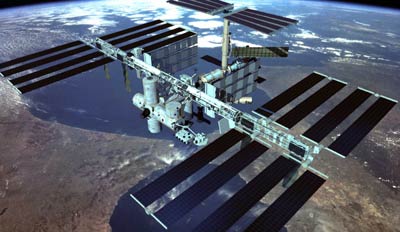Thinking the unthinkable about the ISSby Taylor Dinerman
|
| The Russian space establishment has taken to capitalism like a duck to water. It just seems as if they are having a hard time figuring out the difference between being a partner and being a contractor. |
The US has its own non-ISS priorities, and stopping Iran from getting nuclear weapons and the means to deliver them at long ranges is at the top of the list. This should be a priority for Russia, as well, since the Islamic fundamentalists supported by Iran have long-term ambitions against Russia as well as against America. The murderers of the schoolchildren of Beslan were not Southern Baptists or Ohio Methodists.
In 1941, Stalin refused to accept the massive amount of information from Winston Churchill, as well as from his own top spy in Tokyo, Richard Sorge, that Hitler’s Germany was about to attack. Today, the top leaders in Moscow may be just as blind to the potential for an attack from the south. The Iranians are not about to launch Persian Panzer divisions towards Smolensk, but if they did have nuclear weapons, they would have the cover needed to launch a bloody terrorist campaign aimed at pushing Russia out of the Caucasus. Stopping the mullah’s regime from getting the bomb would seem to be in the interests of both Russia and the US.
For its own reasons, Russia has refused to stop supporting Iran’s nuclear and missile programs. While one can hope that this policy will change in the near future, American policy makers cannot count on such a happy outcome. Without a major change on the part of either the US or the Russians, the ISS partnership is heading for a train wreck. According to Space News, Russia will refuse to accept US astronauts into the Star City training program for Expedition 13 unless Washington promises to pay.
It had been hoped that ESA, or perhaps the Japanese, would step in and pay the Russians something—at least enough so that they could save face. Given the tight budgets at both ESA and JAXA, though, this does not seem to be in the cards. The big question for NASA and for the partnership is: without a permanent US presence on the ISS, can the US Congress be expected to continue to pay the three to four billion dollars a year needed to complete the program, especially since NASA plans to stop using the facility in less than a decade?
If Russia were to continue to provide Soyuz taxi services, it would almost inevitably end up with full, or nearly full, control of the ISS sometime towards the middle of the next decade. It would, of course, still have to deal with the European and Japanese partners, as well as possible future Chinese and Indian participation, but it would be in the position of being the majority shareholder. If one figures that between 2006 and 2015, something like 20 Soyuz flights will be needed, and if the cost of flying a single US astronaut is reckoned at $20 million, then the total cost to Russia for providing this service will be about $400 million. In exchange for this, Russia would, in 2015, get control of an orbital facility that cost US taxpayers on the order of $100 billion to build.
| The big question for NASA and for the partnership is: without a permanent US presence on the ISS, can the US Congress be expected to continue to pay the three to four billion dollars a year needed to complete the program, especially since NASA plans to stop using the facility in less than a decade? |
It looks like Russia will reject this deal, again, for its own reasons. So what are the US alternatives? If the US were to decide to wind up its ISS operations early, without bothering to complete ISS assembly, the Russians would have the current station effectively all to themselves. They would, of course, have to maintain and support it, which would cost them considerably more than they are spending on it now but it would at least be all theirs. Alternatively, the US could get really nasty and insist that all US elements be detached and deorbited. This is a possible “nuclear option” which, for many reasons, is highly improbable.
The US, as well as Europe and Japan, would be stuck with a lot of expensive ISS-specific hardware in storage. Some of it could be salvaged for use in a new equatorial-orbiting station that would be designed, from the start, to support the Vision for Space Exploration. This would require a fundamental rethinking of CEV architecture studies now underway.
The Europeans might decide to stick with the Russians and try and find a way to get their Columbus module up to the ISS without the Shuttle or they might even convince the US to fly one last mission to the ISS to deliver it. The European ATV cargo vessel would be able to fly to the ISS with or without US participation. With a lot of hard work, and probably a lot of groveling, the Europeans could keep a toehold on the ISS. Japan, on the other hand, will probably find it easier to continue bilateral cooperation with NASA on a new station and to find itself a strong niche on the future CEV family of vehicles.
The train wreck might still be avoided, but it would be prudent to begin planning for the aftermath right now. At the very least, these questions should be asked of Mike Griffin during his confirmation hearings.
